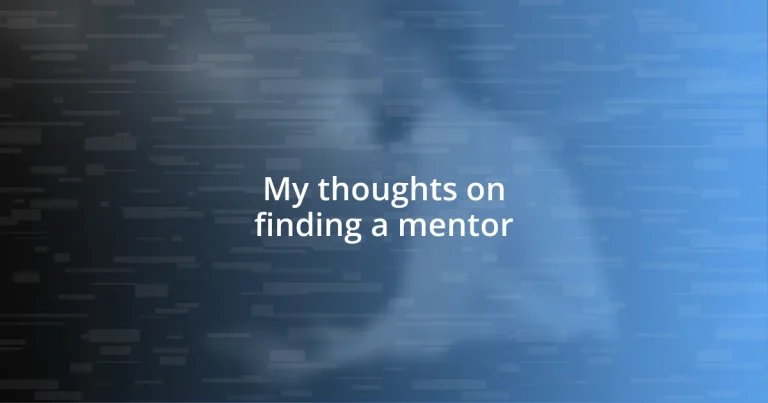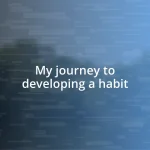Key takeaways:
- Mentorship is essential for personal and professional growth, providing guidance, perspective, and valuable relationships based on trust.
- Identifying specific mentorship needs and approaching potential mentors with genuine outreach significantly enhances the likelihood of forming a successful mentorship.
- Regular communication, openness, and celebrating milestones are crucial elements in building and maintaining a strong mentorship relationship that evolves over time.
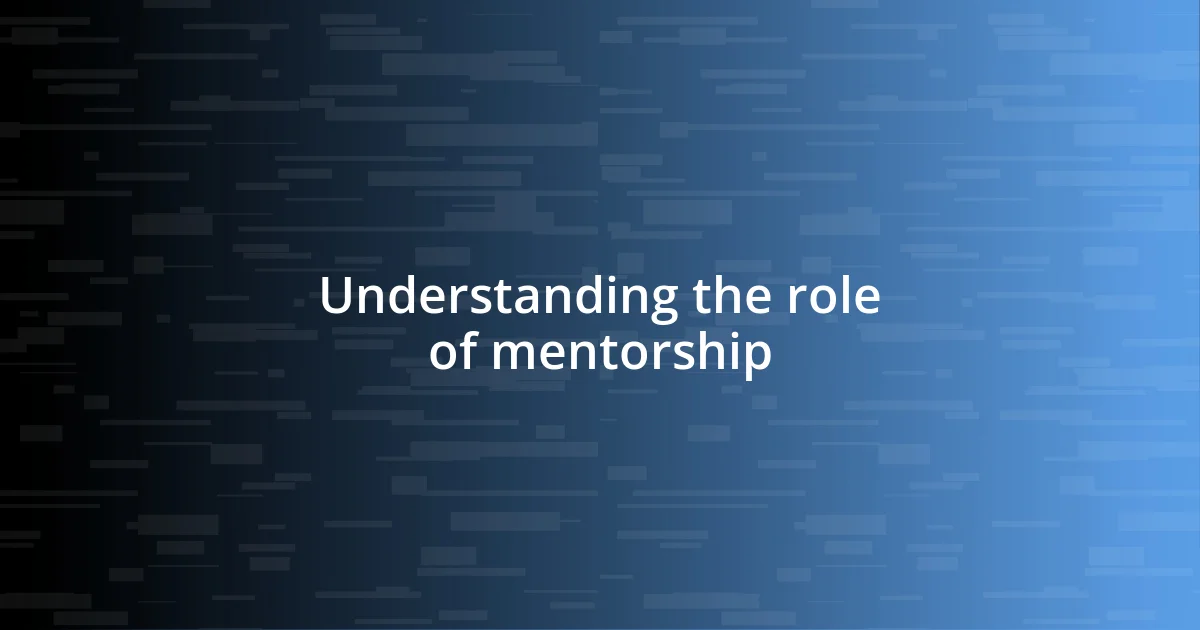
Understanding the role of mentorship
Mentorship plays a crucial role in personal and professional growth. I remember my first mentor, who gently guided me through my early career decisions. That guidance created a safe space where I felt comfortable asking questions and making mistakes. Isn’t it powerful to think that someone believes in your potential?
A mentor often acts as a sounding board, offering invaluable advice that comes from their own experiences. I vividly recall a time when I faced a significant challenge at work. My mentor helped me see the situation from different angles, teaching me that there’s always a lesson to be learned, even from setbacks. Have you ever encountered a situation where a different perspective made all the difference?
Moreover, mentorship is not just about gaining knowledge; it’s about building a relationship grounded in trust and mutual respect. I’ve formed some of my most impactful connections through mentorship. These bonds can lead to opportunities that might never have come my way otherwise. Can you think of a time when a strong connection helped you advance in your journey?
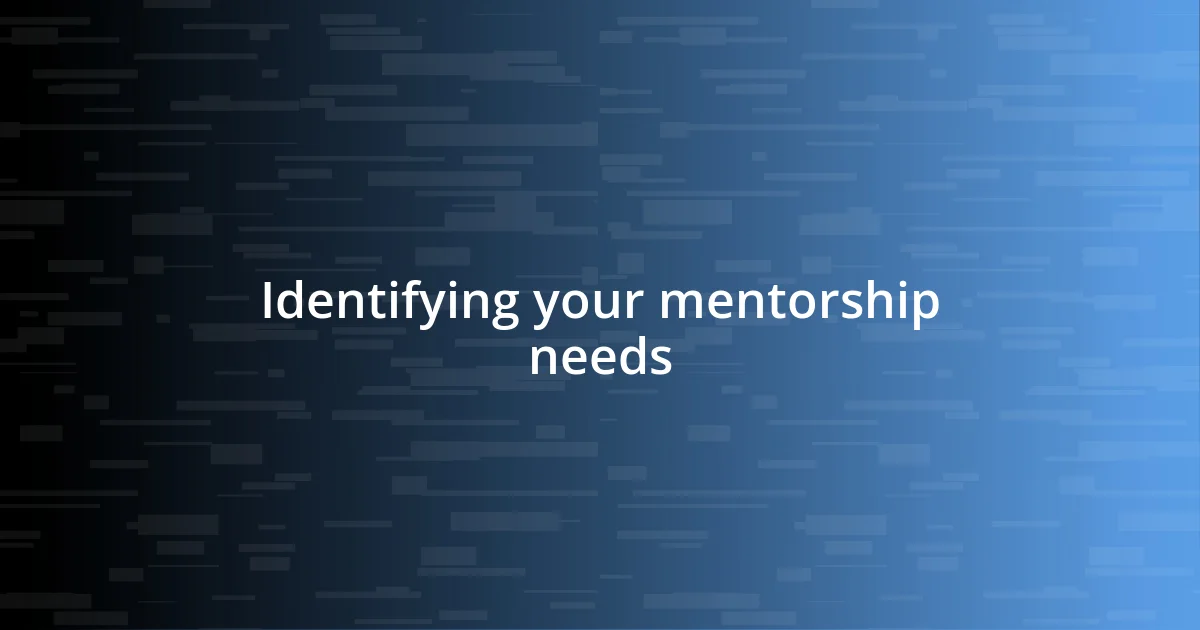
Identifying your mentorship needs
Identifying what you need from a mentor is key to a successful mentorship experience. Reflecting on your career goals and current challenges can help you pinpoint the specific guidance you seek. For instance, during a pivotal moment in my career, I realized that I needed not just someone to provide industry insights but also someone who understood the nuances of transitioning between roles. This clarity allowed me to find a mentor who perfectly matched those needs.
To help you determine your mentorship requirements, consider these points:
- Skill Development: What specific skills are you looking to improve or acquire?
- Industry Insights: Do you need someone with extensive experience in your field?
- Networking Opportunities: Is expanding your professional network a priority?
- Personal Growth: Are you looking for motivation or support to navigate personal challenges?
- Access to Resources: Do you require guidance in finding helpful resources, like workshops or courses?
By breaking down your needs this way, you can approach potential mentors with confidence and purpose.
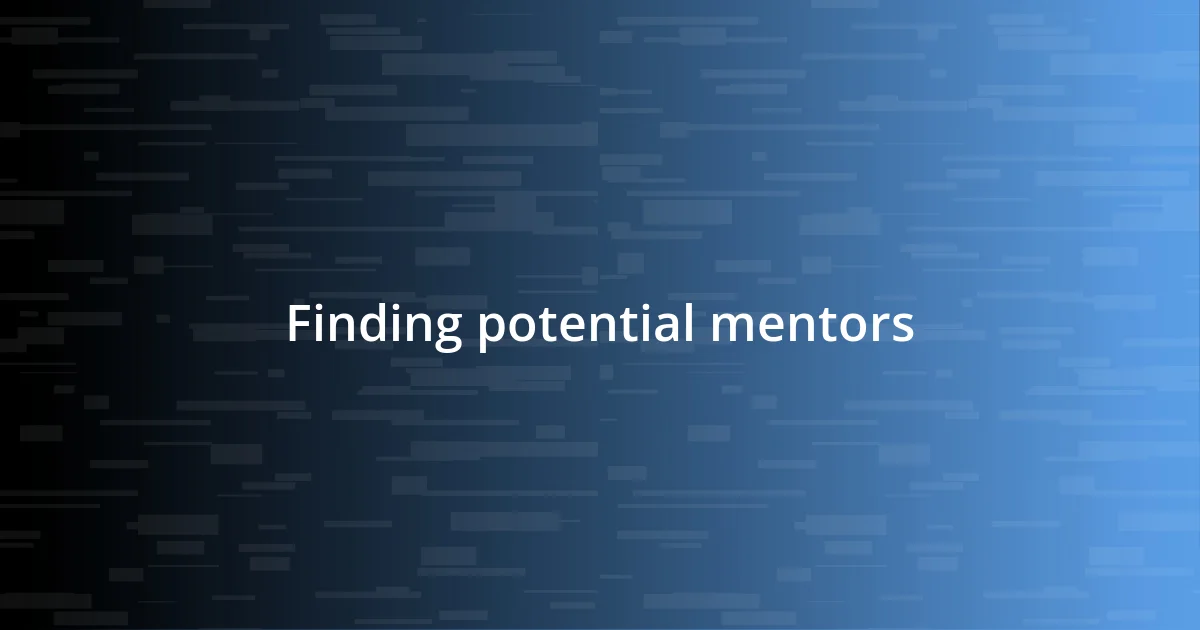
Finding potential mentors
Finding potential mentors can feel daunting, especially when considering the right fit for your journey. I remember scouring my network, looking for someone who not only understood my field but also resonated with my values. One strategy that worked for me was reaching out to industry events or professional groups, where I could meet potential mentors face-to-face. Connecting in person often leads to more authentic conversations.
Networking platforms like LinkedIn can be a gold mine for discovering mentors, but I find that personal outreach yields better results. For example, when I spotted a professional whose career path I admired, I took the initiative to send a thoughtful message explaining my admiration and my goals. That simple act turned into a mentorship that brought so much to my career. It’s amazing how a genuine outreach can blossom into a meaningful connection.
Another effective method is seeking recommendations from friends or colleagues. They might know someone who has that priceless combination of experience and willingness to guide. I once asked a trusted coworker for suggestions, which led to a wonderful mentor relationship that I didn’t even know I needed. Trust me, tapping into your existing connections can unveil opportunities you hadn’t previously considered.
| Method | Description |
|---|---|
| Networking Events | Attending industry-specific events allows for face-to-face connections with potential mentors. |
| LinkedIn Outreach | Direct messages to admired professionals can lead to valuable mentorship relationships. |
| Referrals | Asking friends or colleagues can uncover mentors that align with your needs. |
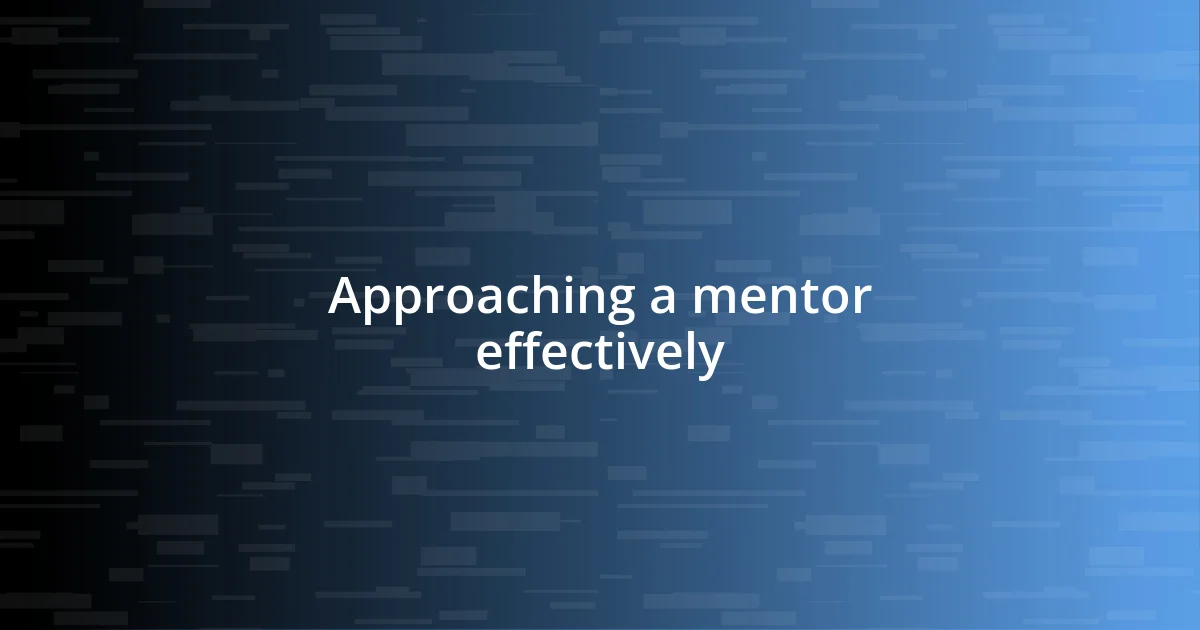
Approaching a mentor effectively
Once you’ve identified your potential mentor, how you approach them can significantly influence the outcome. I remember the first time I reached out to someone I admired; my heart raced as I crafted my message. Instead of launching straight into my request for mentorship, I started by sharing what I appreciated about their work. This personalized touch made them more receptive and showcased my genuine interest. Don’t forget to express what you hope to gain from the mentorship, as this creates a clear context for your request.
Timing and setting are also crucial. There was a time when I took the plunge and asked a leader for a coffee chat right after a conference session. The energy of the moment felt perfect for building connections. I learned that people are often more open to dialogue in relaxed environments, so choose times when your potential mentor isn’t overwhelmed. Consider sending a message that shows you understand their busy schedule and are flexible—this can go a long way in making them feel valued.
Finally, follow up respectfully. After my first discussion with a mentor, I made sure to send a thank-you note, expressing my gratitude for their time and insights. This small gesture reaffirmed my interest in fostering the mentorship. I often wonder how many opportunities are lost because people don’t take that extra step. Remember, maintaining contact and checking in later keeps the relationship warm and shows your commitment, which is essential in nurturing this valuable connection.
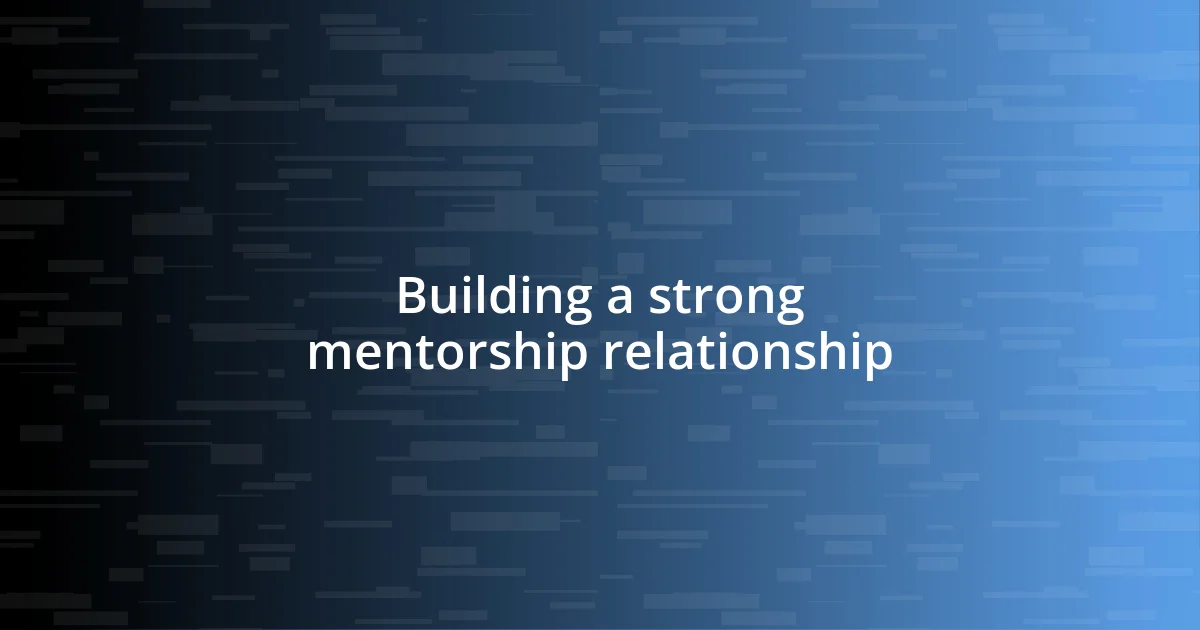
Building a strong mentorship relationship
Building a strong mentorship relationship requires genuine effort and vulnerability. I recall my early days with my mentor when I hesitated to openly discuss my challenges—thinking I had to present a polished version of myself. However, once I shared my struggles, it transformed our relationship. That openness led to more meaningful conversations and allowed my mentor to provide tailored guidance. Isn’t it remarkable how authenticity can pave the way for deeper connections?
Regular communication is another cornerstone of a successful mentorship. In my experience, scheduling consistent check-ins helped me stay accountable and foster trust. I started setting aside time each month for a quick chat, even if just to share updates on my progress. This routine not only kept our dialogue flowing but also reinforced the idea that mentorship is a two-way street—it’s about mutual investment. Have you ever noticed how a simple “How have you been?” can reignite a connection?
Furthermore, I believe it’s essential to be proactive in seeking feedback. When I started asking my mentor for their thoughts on specific projects, it showed that I valued their expertise and was eager to grow. I remember a time when I nervously presented a draft of a report, asking them to critique it. Their insights were invaluable, and it not only improved my work but also deepened our rapport. Don’t underestimate the power of feedback—it’s an opportunity for growth and connection.
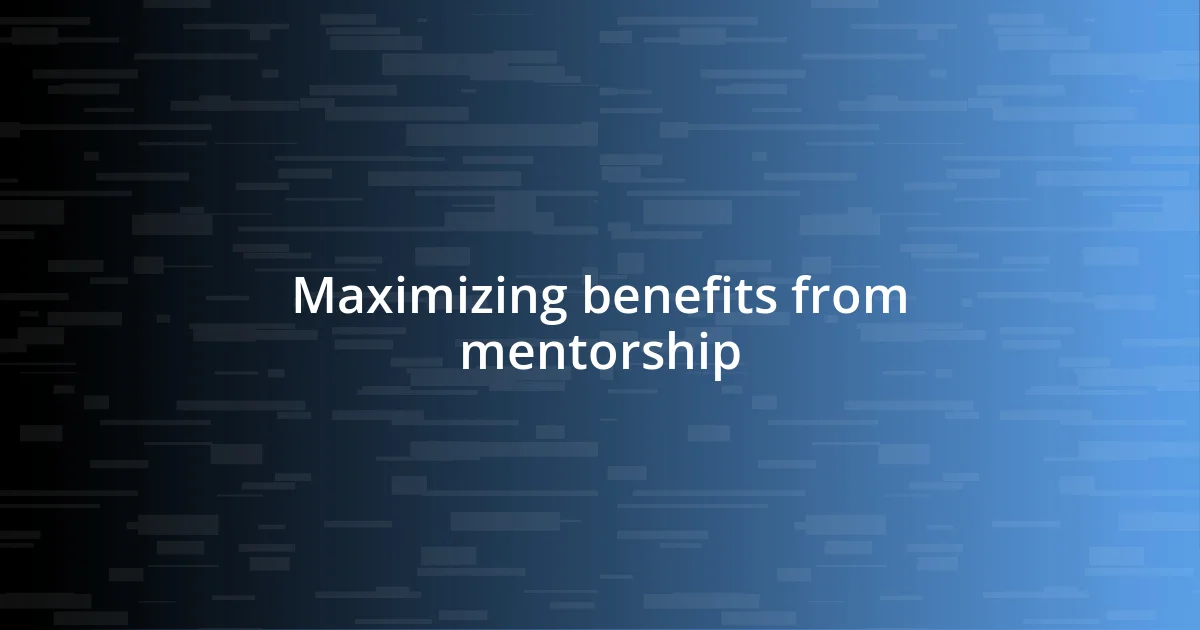
Maximizing benefits from mentorship
Maximizing the benefits from mentorship goes beyond simply meeting up with your mentor. I vividly remember those early sessions when I felt overwhelmed with questions. I realized that preparing specific topics or challenges beforehand helped guide our discussions and made them more fruitful. Think about it—doesn’t having a focused agenda elevate the overall experience for both parties?
Another key aspect is embracing vulnerability. There was a time when I would hold back my true feelings about my career path, fearing judgment. But once I began to share my doubts and aspirations candidly, something incredible happened. My mentor opened up too, sharing their struggles and failures, which not only humanized the experience but also reinforced our bond. Have you ever found that exposing your insecurities can lead to unexpected wisdom?
Lastly, celebrating milestones in your mentorship can amplify its value. I once achieved a significant goal and shared the news with my mentor. Their excitement and recognition made the victory feel even sweeter. It got me thinking—how often do we pause to acknowledge our progress with those who support us? Fostering this atmosphere of celebration nurtures a positive and motivating dynamic, making mentorship all the more rewarding.
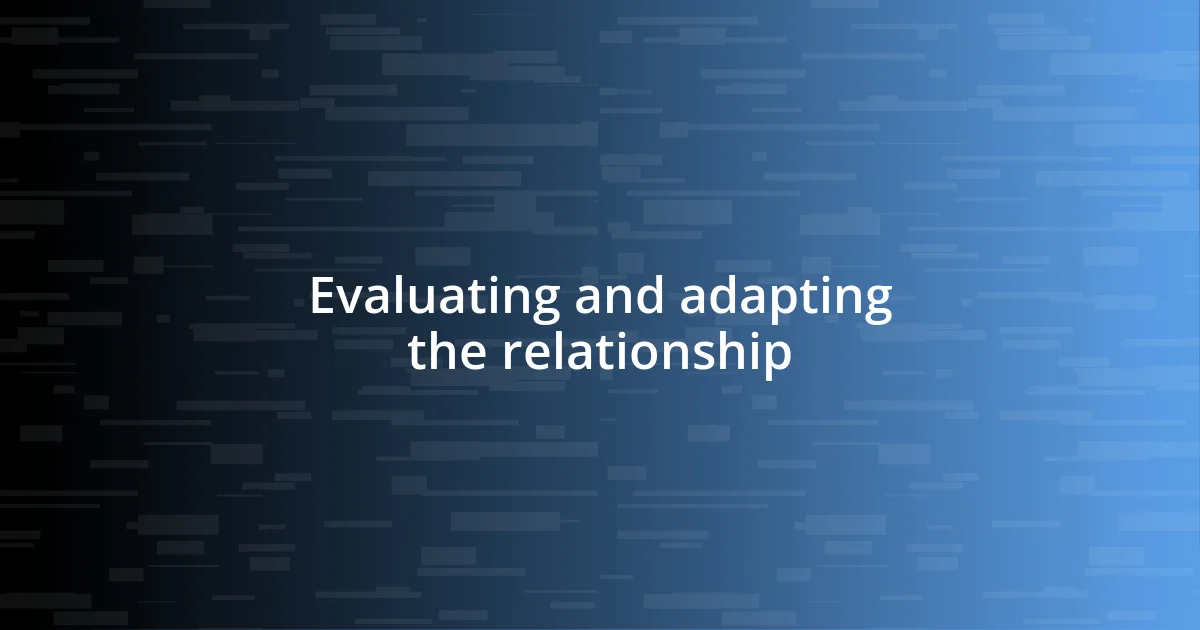
Evaluating and adapting the relationship
Evaluating the mentorship relationship is a vital process that often reveals whether it’s truly beneficial for both parties. I remember one crucial moment when I realized my mentor and I weren’t quite on the same page regarding my goals. By asking direct questions about my progress and intentions, I discovered the need to adjust our focus. It made me wonder—how can we grow if we don’t regularly check in with ourselves and our mentors?
Adapting the relationship requires openness to change and a willingness to redefine expectations. There was an instance when I felt our sessions were becoming too routine, lacking the excitement they once had. By suggesting we explore new topics or even shift our meeting frequency, I breathed new life into our dynamic. Have you considered how flexibility could transform a mentorship that feels stagnant?
Lastly, recognizing when it’s time to pivot away from an existing mentorship is crucial. I had a mentor who, despite being exceptional, didn’t quite align with my current aspirations. I had to reflect on my needs and made the difficult decision to seek guidance elsewhere. That experience taught me that not every mentor-student match is forever; sometimes, course correction is necessary for personal growth. How do you gauge when it’s time for a change in your own mentorship journey?












